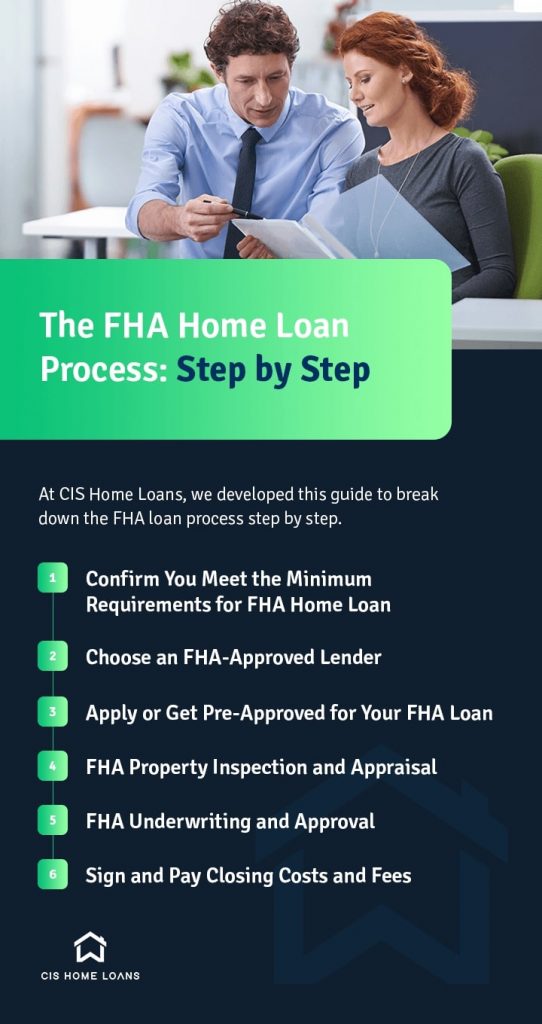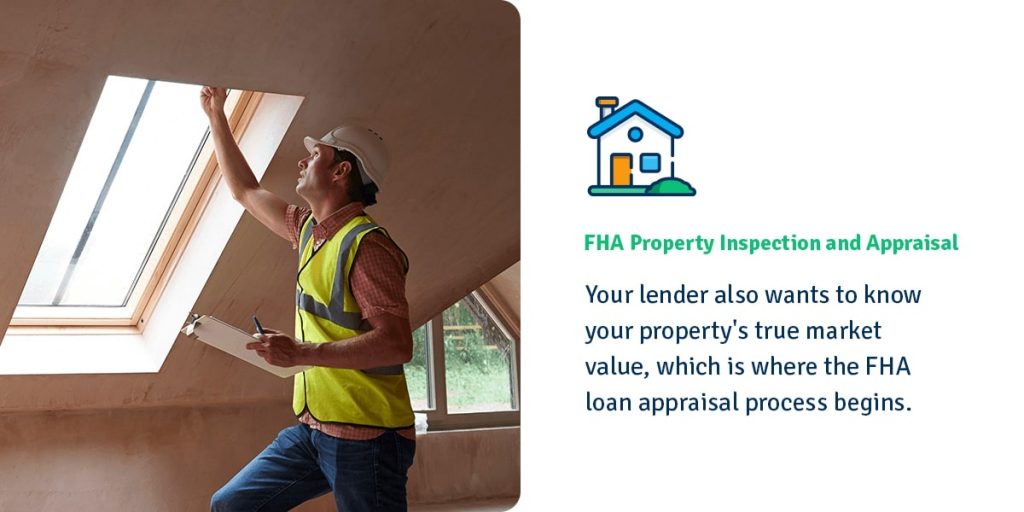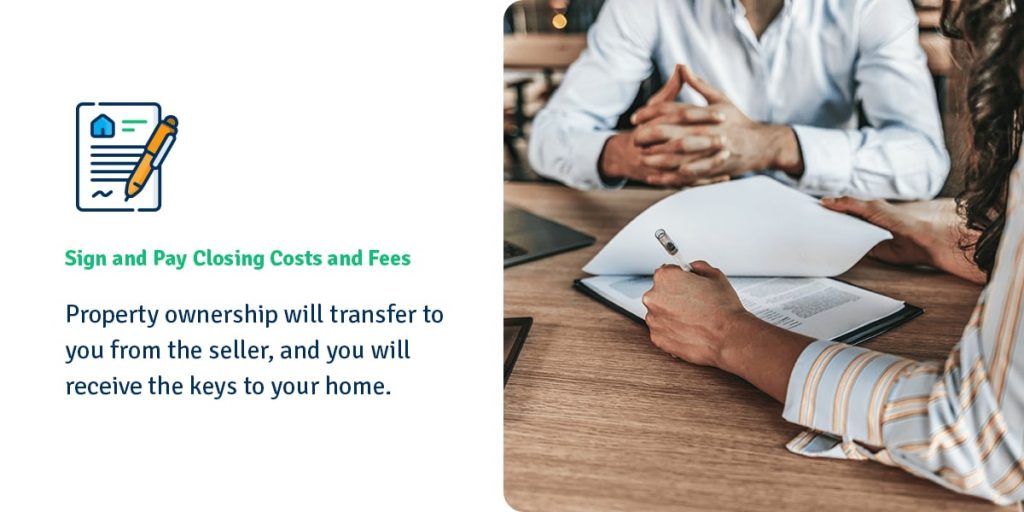
FHA Home Loan Process Timeline
For many homebuyers, the biggest concern is whether or not they can afford the home of their dreams. An FHA loan may be the right loan for you, allowing you to purchase your dream home without the expense of a significant down payment. Purchasing a home is both a huge financial investment and a personal one – this will be your primary residence for several years to come.
If you are a first-time homebuyer, you may be wondering how to start the FHA loan process. At CIS Home Loans, we developed this guide to break down the FHA loan process step by step.
1. Confirm You Meet the Minimum Requirements for FHA Home Loan
How do you get an FHA loan? To qualify for an FHA loan, you need to meet certain minimum requirements. Fortunately, the lower credit requirements and flexible guidelines of FHA loans help many homebuyers purchase properties every year.
- Credit score of at least 580: While conventional loans tend to require a minimum credit score of 620, you may be able to qualify for an FHA loan with a credit score as low as 580. If your credit score is lower, you may still be eligible for an FHA loan if you meet other requirements. However, to increase your chances of securing a loan, you may want to take steps to improve your credit score.
- No recent bankruptcies: Before you can be eligible for an FHA loan, you need to show that you have not filed for bankruptcy within the past few years
- Proof of income: You will need to prove that you have reliable income via recent tax returns or pay stubs. A couple of years of stable employment history that demonstrates you have had a steady income or that your income has increased over time may help you secure an FHA loan.
- Low down payment: How much you will be required to put down on your home will depend on your credit score. If you have a higher credit score, you can pay a down payment of as low as 3.5%. If your credit score is lower, you may need a higher down payment of at least 10% to offset the risk for the lender.
- Primary residence: To be eligible for an FHA loan, the home you are purchasing must be your primary residence rather than used for investment or business purposes.
Low debt-to-income ratio: Your debt-to-income ratio should be less than 43% to qualify for an FHA loan.
With an FHA loan, 100% of your down payment can be paid via a gift, whereas the limit for gift amounts toward a down payment is less than 20% for conventional loans. If you currently have an FHA loan, we also offer refinance options.
2. Choose an FHA-Approved Lender
The next part of the FHA loan process is finding an FHA-approved lender. Despite popular misconception, FHA loans are not made by the government. Instead, they are originated by private lenders and insured by the government. To be approved by the FHA, lenders and loan officers must meet the following requirements:
- Positive net worth
- Experience in loan origination
- Licensing in each state the lender serves
- Credit reports for both the lender and loan officers
- A bond, a completed application and incorporation papers
To find the right FHA lender for you, get pre-approved for a loan and compare terms, rates and fees. You should also consider the lender’s physical locations, customer service and typical customer. For example, if you are self-employed, you may want to select a different lender than a borrower who works for an employer. To determine whether an FHA lender is right for you, consider asking a loan officer the following questions:
- How many FHA loans have you closed?
- How long have you been processing FHA loans?
- How many years of experience do you have as a loan officer?
- What percentage of the loans you issue are FHA loans?
- What is the biggest challenge for obtaining approval for an FHA loan?
- What do you suggest I do to keep the approval process moving along?
- How long do you believe my FHA loan application will take to be processed?
- What is your success rate for obtaining final approval for your FHA loan applicants?
After you ask the loan officer these questions, ask for a Good Faith Estimate. This will include an estimate of the loan costs, such as the interest rate, closing costs, title insurance and fees. You may also want to gauge the attitude of each loan officer you speak with as well.
You deserve a lender that provides you with low costs and good customer service through the channel most important to you, such as online or in-person, and a loan officer you want to work with throughout the FHA home loan process. At CIS Home Loans, our services can help make your dream of homeownership come true.
3. Apply or Get Pre-Approved for Your FHA Loan
In some cases, it may be best to apply for pre-approval before starting your search for a property.
How to Get Pre-Approved for an FHA Loan
While getting pre-approved for an FHA loan is an optional step, it is highly recommended. Pre-approval refers to the process when a lender reviews your financial situation to decide whether you are eligible for an FHA loan and how much they can lend you. This process is known as pre-approval because it occurs before house hunting and is not official approval for the final loan.
If you get pre-approved for an FHA loan, you can prove a mortgage lender has screened you, and you can share this pre-approval letter with sellers when you make an offer on a home. A seller will be more likely to accept your offer when you have a pre-approval letter. After you are pre-approved, you can begin shopping for a property in your price range.
How to Apply for an FHA Home Loan
After you find a home and make an offer, you will complete a Uniform Residential Loan Application, also known as Fannie Mae form 1003, though you may fill out this form at a different stage of the process. On this application, you will provide the property address and the type of loan you want. If your lender asks you to complete this application earlier in the process, such as during the pre-approval stage, you will leave the line for the property address blank.
Completing your loan application may take some time, and you will need to have a lot of information on hand, including:
- Recurring debts
- Income sources
- Income amounts
- Housing expenses
- Your previous and current employers
Be honest on your loan application and complete it to the best of your knowledge. At this stage, you may also need to pay a fee for the mortgage application. If not, your lender may include this fee in your closing costs, which you pay at the end of the process.
4. FHA Property Inspection and Appraisal
After you have been approved for an FHA loan, now what? One of the next steps to buying a home with an FHA loan is agreeing to an FHA inspection by an approved appraiser who will determine the value of the home.
FHA Inspection Process
If you have applied for an FHA loan, your home appraiser will perform a property inspection to determine whether the property meets HUD’s minimum health and safety standards. The appraiser may flag certain issues that need to be corrected before the FHA loan is funded, such as:
- Leakage
- Asbestos
- Peeling paint
- Roof damage
- Loose handrails
- Termite damage
- Severe structural damage
Unlike a regular appraisal for a conventional home loan, if there are discrepancies for an FHA loan, the transaction for the home will be delayed. Though you may not be required to schedule a regular home inspection with an FHA loan, you may still want to do so.
FHA Appraisal Process
Your lender also wants to know your property’s true market value, which is where the FHA loan appraisal process begins.
Along with evaluating the property you want to buy, a licensed appraiser will estimate its current market value. They base their assessment on recent prices for similar homes in the area, along with the unique features and condition of the property. Your lender needs to know what the home’s potential resale value is in case you fail to make your mortgage payments and the lender needs to foreclose and sell the property.
If the home is appraised for the amount or more than the amount that you have agreed to pay, your FHA loan process will likely move forward smoothly. However, if the appraiser determines that the home is worth less than what you agreed to pay, this will present an obstacle for the process and delay the FHA loan process timeline.
5. FHA Underwriting and Approval
The next part of the FHA home buying process is underwriting, followed soon after by approval.
Underwriting is a crucial step in the FHA loan approval process. This step is one of the most mysterious for many homebuyers, as you typically don’t deal directly with the underwriter of your loan. Your primary contact throughout the application process is usually with your loan officer.
The underwriter’s job is to analyze your paperwork, credit score and income to determine if your loan is sound. If the underwriter identifies minor issues, you may be asked to submit a letter of explanation or take another action to resolve the issue. This could delay FHA home loan processing time.
If you receive this request, rest assured that these conditions occur fairly regularly. Simply provide the information needed to keep the process moving forward. On the other hand, if your underwriter finds a more serious issue, this could render your FHA loan unsound. Once you are past this step, you will likely be approved for the FHA loan.
When the underwriter is satisfied that you meet the lender’s guidelines and FHA guidelines, you can close.
6. Sign and Pay Closing Costs and Fees
The last step of the FHA loan closing timeline is to sign your loan documents and pay the fees and closing costs. You will likely receive your official loan estimate soon after you finish applying for your loan. Closing costs tend to include:
- Appraisal
- Excise tax
- Underwriting
- Attorney fees
- Property taxes
- Surveying fees
- Recording fees
- Prepaid interest
- Loan processing costs
- Title insurance and searches
Closing costs are typically a small percentage of your total loan amount. The FHA allows home builders and sellers to pay a portion of your closing costs. Your lender can also roll your closing costs into your loan, though this may mean you need to pay a higher interest rate. Additionally, some closing costs may be negotiable.
In some cases, you may also be eligible for assistance with a down payment or closing costs. FHA loans can be paired with local and state mortgage programs to help you pay some of these upfront costs. Many programs are intended to help lower-income homebuyers and first-time homebuyers.
At this stage of the FHA home loan process, you will also receive your financing. Property ownership will transfer to you from the seller, and you will receive the keys to your home.
Apply for FHA Loan Pre-Approval From CIS Home Loans
At CIS Home Loans, we strive to help our customers finance their dream homes. We offer some of the most competitive rates in the industry to make that happen. We have been offering our services since 1991, and when you choose us as your full-service mortgage bank, you can expect integrity and quick turnaround times.
Since the day we opened our doors, we have been providing industry-leading services without sacrificing our small-town ideals. We maintain fruitful, long-standing partnerships with industry leaders, allowing us to keep up to date on the latest programs and trends.
Are you looking for an FHA loan to finance your dream home? Apply for an FHA loan now at CIS Home Loan to start the FHA mortgage process or contact us to learn more about the FHA home loan application process.





